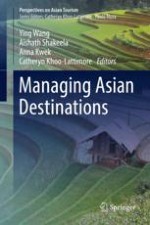2018 | OriginalPaper | Chapter
8. Temples, Tuk-Tuks and Orphanages: A Contemporary Examination of Tourism Development, Management and Community-Based Tourism in Cambodia
Authors : Simon Pawson, Scott Richardson, Paul D’Arcy
Published in: Managing Asian Destinations
Publisher: Springer Singapore
Activate our intelligent search to find suitable subject content or patents.
Select sections of text to find matching patents with Artificial Intelligence. powered by
Select sections of text to find additional relevant content using AI-assisted search. powered by
